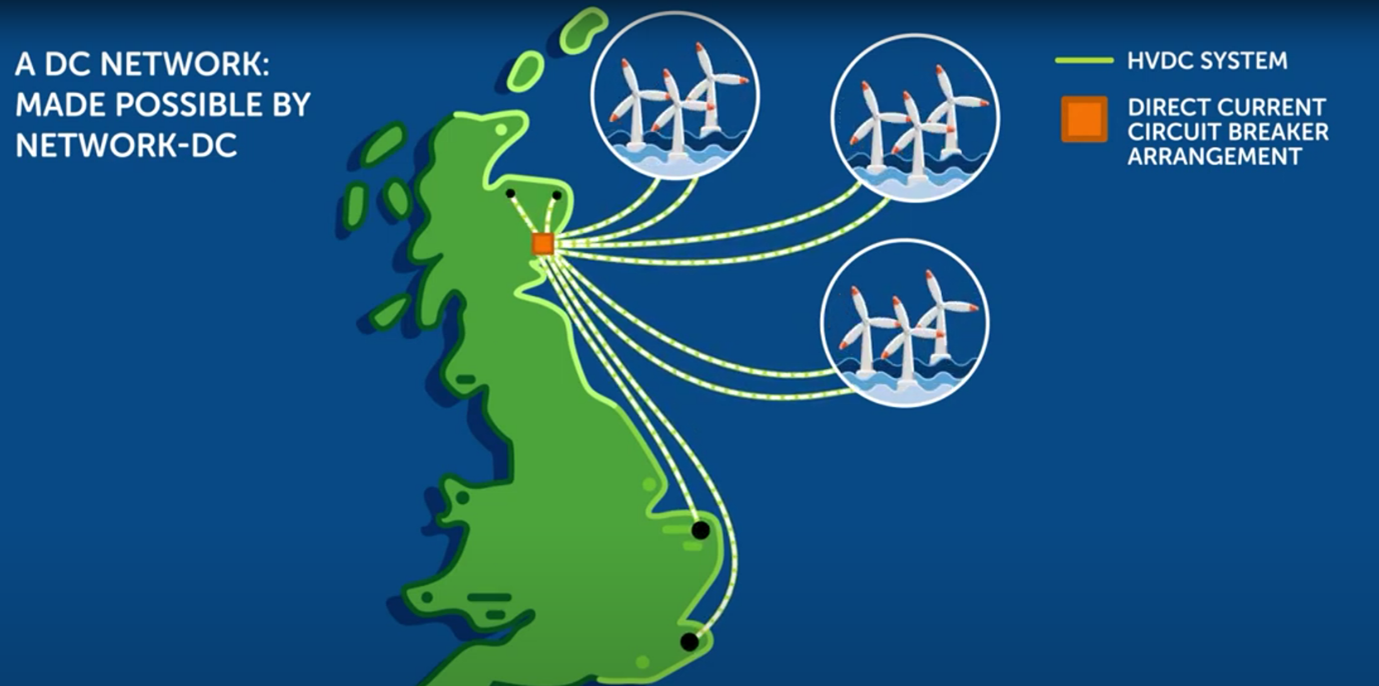SuperGrid Institute launches into the next phase
of the Network DC project
The Alpha phase of the Network DC project has successfully come to an end and SuperGrid Institute, along with the other consortium members, are getting stuck into the Beta phase; diving deeper into the functional and technical specifications of the DC switching station to be implanted into the UK’s first HVDC network. Building on the DC switching station configurations proposed in the Alpha phase, our team will now draw on its expertise in system modelling, simulation and analysis to build a comprehensive DC grid protection strategy for the future HVDC network.
THE PROJECT
In August 2022, we announced that we would be taking part in the Network DC project, working with an all-UK-based consortium to create a DC network that connects multiple offshore wind farms into one onshore DC hub, without the need for an intermediate DC/AC and AC/DC conversion, thereby reducing the number of AC substations in coastal regions and simplifying the redistribution of generated power to other areas.
This multi-phase initiative aims to innovate and optimise the UK’s first HVDC network which is due to be installed in the northeast of Scotland, providing greater flexibility within the grid, and enabling an increased connection capacity for renewable energy generation through the development of onshore high voltage direct current (HVDC) hubs.

Ofgem SIF Discovery project: Network-DC © Innovate UK
This project is funded by energy network users and consumers through the Strategic Innovation Fund (SIF), a programme from the UK’s independent energy regulator Ofgem managed in partnership with Innovate UK.
Projects financed by the SIF embark on a journey of 3 phases: the Discovery phase (feasibility studies, lasting 2-3 months), the Alpha phase (proof of concept projects, lasting 6 months) and the Beta phase (large-scale demonstrator developments, lasting up to 5 years).
At each stage, the number of financed projects is reduced. Of the 40 Discovery projects launched in 2021, only 10 have made it to the Beta phase, including Network DC! This achievement equates to the Network DC Project being awarded funding of £6M over 3.5 years for the project’s consortium.
THE BETA PHASE: DIVING DEEPER INTO THE SPECIFICATIONS
With the Alpha Phase now complete, the consortium is moving, into the Beta Phase for more in-depth development and testing.
During the Alpha Phase, SuperGrid Institute addressed the complex challenge of integrating DC circuit breakers (DCCB) into a multi-terminal HVDC network. Our multi-terminal DC control & protection team, in collaboration with our project partners, were able to propose a variety of configurations for the DC switching station that will be developed at Peterhead, in the northeast of Scotland. Their insights into the system’s performance and economic evaluation yielded crucial data to make informed decisions around the preliminary specifications of a DC switching station.
As we transition into the Beta Phase, our focus is set on the functional and technical specifications of DCCBs and DC limiting reactors – key elements of the DC switching station. The aim until February 2025 is clear: to build a comprehensive DC grid protection strategy, addressing both primary and backup protection schemes. Our team will work to define system requirements based on detailed data and sensitivity analyses, making use of their expertise in system modelling, simulation and analysis. This will lay the groundwork for our partners who will continue the Network-DC journey until June 2026, where the integration of the DCCB will be demonstrated in an advanced HIL simulation platform.
The launch of Network DC’s Beta phase signifies a significant step towards a more adaptable, efficient, and future-ready HVDC network, in alignment with the ambitious goals of expanding offshore wind capacity and achieving net-zero emissions in the UK and Europe.
Project partners: Scottish Hydro Electric Transmission Plc (National HVDC Centre) (Lead), University of Edinburgh, Carbon Trust Advisory Ltd, National Grid ESO Ltd, SuperGrid Institute


